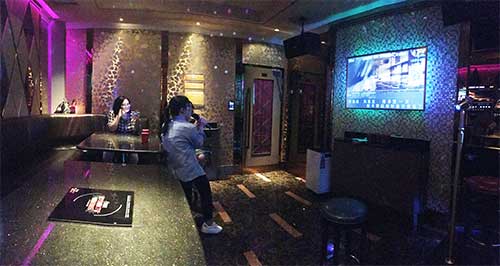Chinese Karaoke aka KTV (A Beginners Guide) - What’s It Really Like?
Chinese karaoke, commonly known as KTV, is a vibrant and immersive entertainment experience that goes far beyond simply singing along to your favorite tunes. Unlike Western-style karaoke bars, KTV in China offers private rooms, high-tech sound systems, and an extensive song selection—creating a lively social atmosphere perfect for friends, family, or even business gatherings. For beginners, stepping into a KTV lounge can be both exciting and overwhelming, with its unique customs, etiquette, and unspoken rules. This guide explores what KTV is really like, from booking a room to mastering the mic, ensuring you’re ready to dive into one of China’s most beloved pastimes with confidence.
What to Expect at a Chinese KTV: A First-Timer's Guide
1. The Basics of Chinese KTV
Chinese KTV (Karaoke Television) is a popular form of entertainment where groups rent private rooms to sing along to music videos. Unlike Western-style karaoke bars, KTV venues in China are often luxurious, with high-quality sound systems, themed rooms, and food and drink services. It's a social activity where friends, family, or colleagues gather to sing, relax, and enjoy each other's company.
| Feature | Description |
|---|---|
| Private Rooms | Groups get their own space with couches, microphones, and a TV. |
| Song Selection | Huge libraries of Chinese and international songs with lyrics on-screen. |
| Food & Drinks | Many KTVs offer menus with snacks, meals, and alcoholic beverages. |
2. How to Choose a KTV Venue
Not all KTVs are the same—some cater to luxury experiences, while others are more budget-friendly. Look for venues with good reviews, updated song libraries, and clean facilities. Popular chains like Party World (钱柜) and Melody (麦乐迪) are reliable choices. Prices vary based on room size, time of day, and additional services.
See AlsoPanning: How to keep similar Chinese characters and words separate| Factor | What to Check |
|---|---|
| Location | Choose a venue near public transport or with parking. |
| Pricing | Compare hourly rates and package deals. |
| Song Catalog | Ensure they have a mix of Chinese and international hits. |
3. Etiquette and Tips for First-Timers
If it's your first time at a Chinese KTV, follow these tips to fit in: arrive on time, take turns singing, and don’t hog the microphone. It’s common to order food and drinks to share, and tipping isn’t expected. Most importantly, relax and have fun—perfection isn’t required!
| Do's | Don'ts |
|---|---|
| Share the mic | Don’t dominate the song queue. |
| Applaud others | Don’t criticize someone’s singing. |
| Order group snacks | Don’t bring outside food/drinks. |
4. The Role of Food and Drinks in KTV
Many KTVs offer full menus with dishes like fried rice, skewers, and hot pot, along with beer, cocktails, and soft drinks. Some places even have all-you-can-eat or all-you-can-drink packages. Food and drinks enhance the experience, making it a mix of dining and entertainment.
| Popular KTV Foods | Common Drinks |
|---|---|
| Fried snacks (e.g., chicken wings, fries) | Beer (local and imported) |
| Hot pot (in upscale KTVs) | Cocktails (sometimes with singing-themed names) |
5. Differences Between Western Karaoke and Chinese KTV
Unlike Western karaoke bars, where singing is often public, Chinese KTV focuses on private group experiences. The rooms are soundproof, allowing for a more intimate setting. Additionally, Chinese KTVs often have advanced booking systems, professional-grade equipment, and even staff to assist with technical issues.
See AlsoOnline Slang For Texting In Chinese| Western Karaoke | Chinese KTV |
|---|---|
| Public singing in a bar setting | Private rooms for groups |
| Basic equipment | High-end sound systems |
What happens in Chinese karaoke bars?

The Atmosphere in Chinese Karaoke Bars
Chinese karaoke bars, often called KTVs, are lively and vibrant places where groups of friends, family, or coworkers gather to sing and socialize. The atmosphere is usually private and exclusive, as most KTVs offer individual rooms for rent. These rooms are equipped with high-quality sound systems, large screens, and comfortable seating. The decor ranges from modern and sleek to extravagant and themed, depending on the establishment.
- Private rooms ensure a more intimate experience compared to Western-style open-bar karaoke.
- Lighting effects like disco balls and LED lights enhance the energetic vibe.
- Food and drinks are often served, with menus featuring snacks, alcohol, and sometimes full meals.
Popular Activities in Chinese Karaoke Bars
Beyond singing, Chinese karaoke bars offer a variety of activities to keep guests entertained. Many KTVs include games, such as dice or card games, to add fun between singing sessions. Some venues even have dance floors or live performances on certain nights. The focus is on group enjoyment, making it a popular choice for celebrations like birthdays or corporate events.
See AlsoThe Language of China: Chinese Mandarin - A Comprehensive Guide- Group singing is the main activity, with friends taking turns to perform.
- Drinking games are common, especially among younger crowds.
- Social bonding is a key aspect, as KTVs are a staple for networking and relaxation.
Music Selection in Chinese Karaoke Bars
The music library in Chinese KTVs is vast, catering to diverse tastes. It includes Mandarin pop, Cantonese hits, and even international songs in English, Korean, and Japanese. Many systems feature real-time scoring to rate singers' performances, adding a competitive edge. Some high-end KTVs update their playlists frequently to include the latest chart-toppers.
- Mandarin classics from artists like Jay Chou and Faye Wong are staples.
- International hits allow non-Chinese speakers to join in.
- Duet options encourage collaborative performances.
Food and Beverage Offerings
Chinese karaoke bars often double as mini-restaurants, offering a wide range of food and drinks. The menu typically includes finger foods like fried chicken, fries, and dumplings, as well as more substantial dishes like hot pot or noodles. Alcoholic beverages, such as beer, whiskey, and cocktails, are popular, with some places offering all-you-can-drink packages.
- Snack platters are ideal for sharing during long singing sessions.
- Signature cocktails often have playful, music-themed names.
- Late-night menus cater to guests who stay until the early hours.
Cultural Significance of Chinese Karaoke Bars
KTVs hold a special place in Chinese culture, serving as a social hub for all ages. They are a preferred venue for business entertainment, where deals are often discussed over songs and drinks. For younger generations, KTVs are a place to unwind and express themselves, while older crowds enjoy nostalgic tunes from their youth.
- Business networking is common, with KTVs acting as informal meeting spaces.
- Generational bonding occurs as families share music from different eras.
- Cultural preservation is evident through the popularity of traditional Chinese songs.
What do people do at KTVs?

Singing Popular Songs
At KTVs, the primary activity is singing. People choose from a vast catalog of songs, ranging from pop and rock to ballads and classics. The experience is enhanced by high-quality sound systems and private rooms. Here’s what typically happens:
- Select songs from a digital catalog or songbook.
- Take turns singing solo or in groups.
- Use microphones and sometimes even stage lights for added fun.
KTVs are popular venues for social gatherings. People visit with friends, family, or colleagues to bond over music and entertainment. The private rooms create a comfortable space for interaction. Common activities include:
- Catching up while waiting for a turn to sing.
- Sharing food and drinks ordered from the venue.
- Celebrating special occasions like birthdays or promotions.
Ordering Food and Drinks
Most KTVs offer a menu of snacks, meals, and beverages to enjoy while singing. The food ranges from simple finger foods to full-course meals. Popular choices include:
- Fried snacks like chicken wings or fries.
- Alcoholic drinks such as beer or cocktails.
- Non-alcoholic options like soft drinks or tea.
Playing Games and Challenges
To make the experience more engaging, people often play games at KTVs. These can be song-related or general party games. Examples include:
- Sing-off competitions with scoring based on pitch or performance.
- Drinking games tied to song choices.
- Charades or trivia while taking breaks from singing.
Enjoying Themed Rooms and Decor
Many KTVs feature themed rooms with unique decor, lighting, and ambiance. These settings enhance the overall experience. Features may include:
- Disco-style lighting for a party vibe.
- VIP rooms with luxury seating and premium sound systems.
- Karaoke stages for those who want a more performative feel.
What is the best karaoke app with Chinese songs?

Best Karaoke Apps with a Wide Selection of Chinese Songs
If you're looking for a karaoke app with an extensive library of Chinese songs, consider these top options:
- Smule: Offers a vast collection of Mandarin and Cantonese songs, including duet features and professional backing tracks.
- WeSing: A popular app in Asia with a strong focus on Chinese music, real-time scoring, and social sharing.
- StarMaker: Features trending Chinese pop songs, voice effects, and live competitions.
Features to Look for in a Chinese Karaoke App
When choosing the best karaoke app for Chinese songs, prioritize these key features:
- Lyrics Display: Accurate, synchronized lyrics in both simplified and traditional Chinese.
- Song Library: Regular updates with the latest Mandopop and Cantopop hits.
- Recording Tools: High-quality audio recording and editing options.
Free vs. Paid Chinese Karaoke Apps
Understanding the differences between free and paid karaoke apps can help you decide:
- Free Apps: Often include ads and limited song access (e.g., WeSing Lite).
- Paid Subscriptions: Unlock premium features like offline mode and exclusive tracks (e.g., Smule VIP).
- In-App Purchases: Some apps allow buying individual songs or credits.
Many karaoke apps emphasize social interaction for a richer experience:
- Duet Functionality: Sing with friends or strangers in real time.
- Leaderboards: Compete for high scores on popular Chinese songs.
- Live Streaming: Apps like StarMaker let users broadcast performances.
Offline Use and Accessibility for Chinese Karaoke Apps
For uninterrupted singing, check these offline features:
- Downloadable Songs: Save tracks for offline use (common in paid versions).
- Regional Restrictions: Some apps limit content outside Asia; consider VPNs.
- Language Support: Apps like WeSing offer multilingual interfaces.
How much does KTV cost in China?

Average Cost of KTV in China
The average cost of KTV in China varies depending on factors like location, time, and venue quality. Here’s a breakdown:
- Budget KTV: ¥50–¥150 per hour for small rooms in less central areas.
- Mid-range KTV: ¥150–¥300 per hour, often including better sound systems and decor.
- Luxury KTV: ¥300–¥800+ per hour, featuring premium services and private VIP rooms.
Factors Affecting KTV Pricing
Several elements influence KTV costs in China:
- Location: City centers or tourist areas charge higher rates.
- Time: Evenings and weekends are more expensive than weekday afternoons.
- Room Size: Larger rooms for groups cost significantly more.
Additional Fees in KTV Venues
Beyond the base rate, extra charges may apply:
- Food/Drinks: Snacks and alcohol can double the total bill.
- Service Fees: Some venues add a 10–15% service charge.
- Membership Discounts: Regulars may get deals via loyalty programs.
Regional Price Differences
KTV prices fluctuate across Chinese cities:
- Tier 1 Cities (Beijing/Shanghai): ¥200–¥600 per hour for mid-range spots.
- Tier 2 Cities (Chengdu/Hangzhou): ¥100–¥400 per hour.
- Smaller Towns: As low as ¥30–¥100 per hour.
Ways to Save on KTV Expenses
To reduce spending at KTVs:
- Off-Peak Hours: Book daytime slots for discounts.
- Package Deals: Look for bundled food/drink offers.
- Group Splitting: Share costs with friends to lower per-person fees.
Frequently Asked Questions (FAQ)
What is Chinese Karaoke (KTV) and how does it differ from Western karaoke?
Chinese Karaoke, commonly known as KTV, is a popular entertainment activity in China and other Asian countries where friends or colleagues gather in private rooms to sing along to music videos. Unlike Western karaoke, which often takes place in bars with a public stage, KTV offers a more intimate and exclusive experience. The rooms are equipped with high-quality sound systems, microphones, and large screens displaying lyrics. Additionally, KTV venues often provide food, drinks, and even games, making it a social event rather than just a singing activity.
What should I expect during my first KTV experience in China?
If it's your first time at a KTV in China, expect a lively and immersive experience. You'll typically rent a private room by the hour, where you and your group can choose from a vast library of songs, including Mandarin, Cantonese, and international hits. The atmosphere is relaxed, and no one will judge your singing skills—it's all about fun. Many venues also offer food and drink menus, ranging from snacks to full meals, and some even have alcohol packages. Don’t be surprised if your friends encourage you to sing duets or group performances!
How do I choose a good KTV venue in China?
Selecting the right KTV venue depends on your preferences and budget. High-end KTVs like Party World (钱柜) or Melody (麦乐迪) offer luxurious rooms, top-notch sound systems, and extensive song selections. For a more budget-friendly option, smaller local chains or independent KTVs are available. Check online reviews on platforms like Dianping to compare prices, room quality, and hygiene standards. Also, consider the location—some KTVs are open late, making them ideal for nightlife, while others cater to daytime customers.
Are there any etiquette rules I should follow at a Chinese KTV?
Yes, there are a few unwritten rules to ensure a smooth KTV experience. First, take turns when singing—hogging the microphone is frowned upon. It’s polite to applaud or cheer after someone performs, even if they’re not the best singer. If you’re invited by a Chinese friend, they might order food or drinks for the group, so it’s courteous to participate. Additionally, some KTVs have a minimum spending requirement, especially on weekends or holidays, so clarify costs beforehand. Lastly, respect the room’s time limit to avoid extra charges.
Leave a Reply

Related Posts